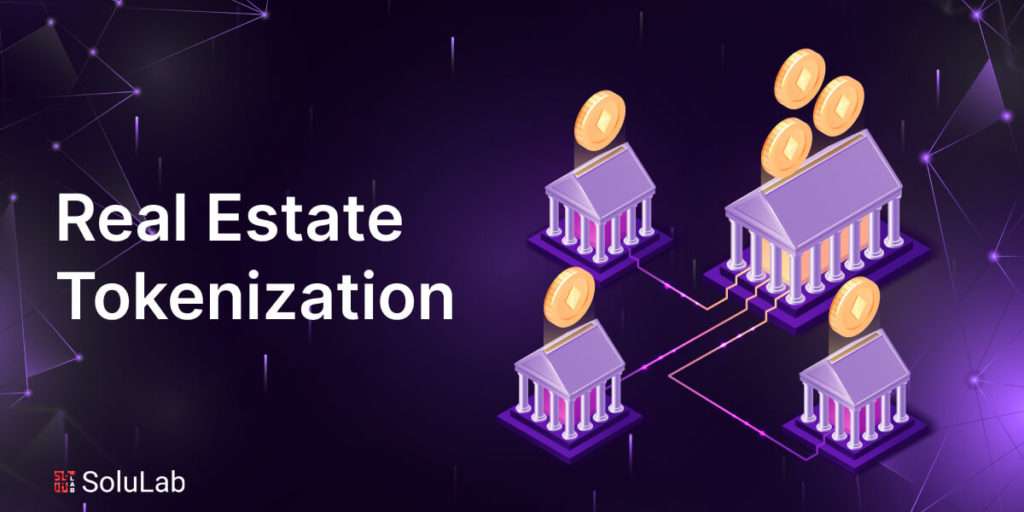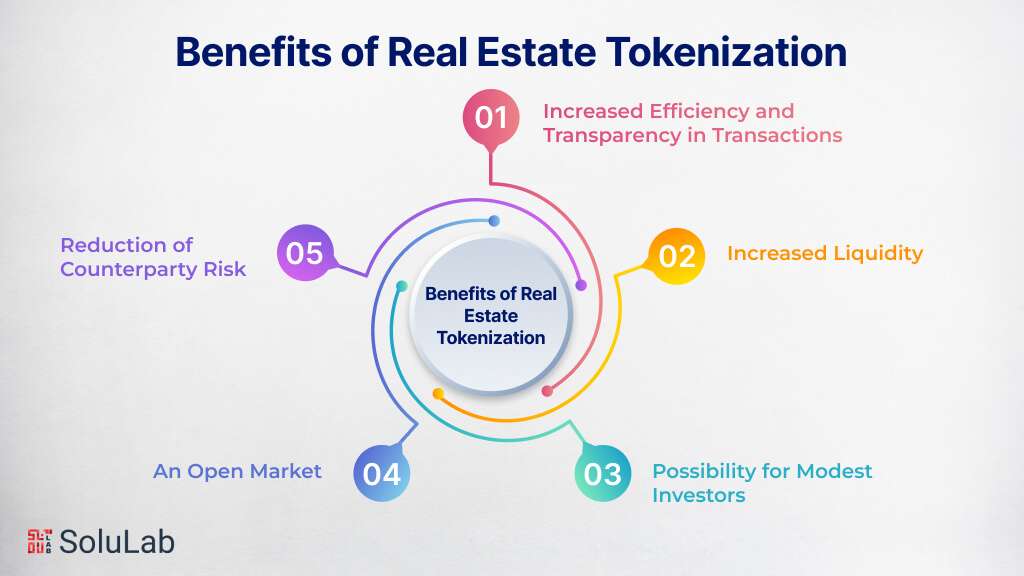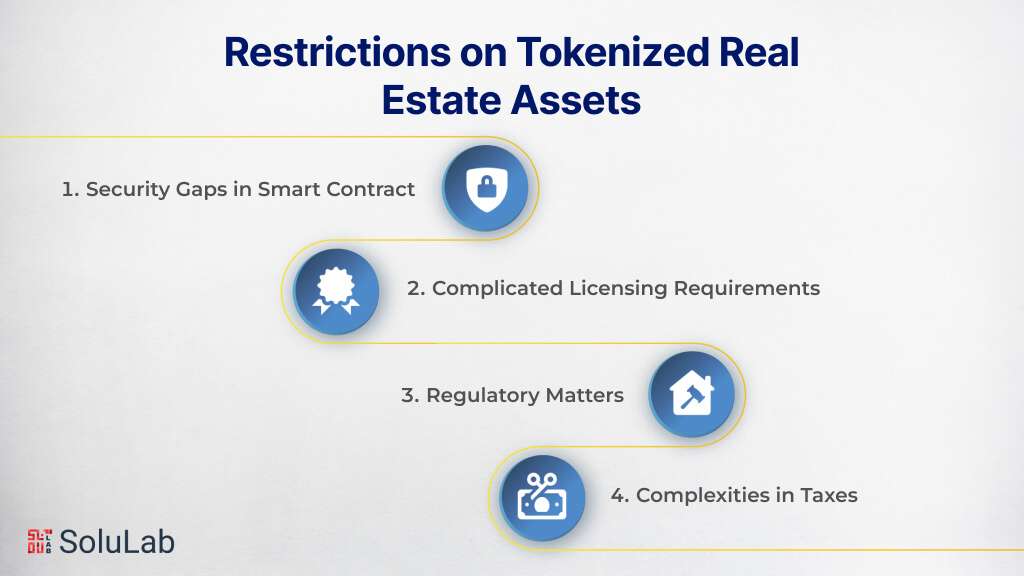
The real estate industry has undergone a total makeover as a result of the use of blockchain technology. It has made it easier for people to own digital real estate, giving access to those who were previously shut out owing to a lack of resources and masking problems like a lack of transparency and trust.
Real estate has historically required large capital outlays and drawn-out transaction procedures, making it a somewhat illiquid asset. However, asset tokenization has changed the situation. Furthermore, there is now unheard-of transparency thanks to the underlying blockchain technology. Having stated that, purchasers of tokenized real estate can now carry out transactions immutably.
In addition to demystifying real estate tokenization, this essay answers queries about its existence, the practical operation of real estate tokens, definition of tokenized ownership, and amount of tokenized real estate. Let’s examine how the domain has changed as a result of real estate’s fractionalization and tokenization first.
What Does Real Estate Tokenization Entail?
The act of dividing an item into digital tokens that symbolize the underlying property with all of its rights and liabilities is known as “tokenization of real estate.” Contractual details are defined through the use of smart contracts. If a predetermined contract condition is met, the algorithm stored in the digital contract triggers the events specified in the code.
For example, without requiring human intervention, a smart contract may carry out a transfer in the land registry. It adds the new block to the blockchain automatically after validating the operations.
NFTs are fractionalized using ERC-721 tokens. ERC-721 is linked to a smart contract that records the transactions in which these tokens are involved and denotes a predetermined standard on the Ethereum blockchain. The purpose of the ERC-721 standard is to improve transaction security and traceability.
Read Also: ERC-3643 vs ERC-1400 vs ERC-20
How Does Tokenization for Real Estate Operate?
Tokenization real estate is akin to crowdfunding, in which an asset is divided into smaller portions via the use of a smart contract—a piece of automated code stored on a blockchain. A portion of the real estate belongs to whoever purchases or holds a token. They have a claim on the underlying asset, including any profits or losses incurred.
To further comprehend it, let’s say someone needs immediate cash and owns a $100,000 home. However, the owners are hesitant to part with their property for less money, and the investors who approach them lack the necessary funds.
Tokenization comes in helpful in this situation. Each of their dispersed assets will be worth $1,000 worth of digital tokens. In this manner, it will be simple to invest in the asset over time. Since this is being done across a decentralized network, total transparency is guaranteed.
Any type of real estate, including residential, commercial, and trophy properties, may be tokenized. Fractional slices of expensive commercial buildings, including malls and retail centers, might be used to lower the cost of investments. Tokenization of apartments in multi-story residential skyscrapers can expedite sales and acquisitions. Through tokenization, one might raise money for initiatives while selling their prize asset.
Properties that are extremely rare and in high demand by investors are referred to as trophy assets. Trophy assets are iconic structures that have significant real estate foundations. It’s not always a structure. It may even be a riverside adorned with priceless stones or a vineyard with grapes of extraordinary quality for making wines. As a result, everything may be tokenized, including ownership of the collateralized debt, an equity stake in a legal corporation, and a digitalized part of a piece of the deed.
To give an understanding of how real estate may be tokenized, we will now detail many options in both the residential and commercial real estate sectors.
Please take note that none of the examples below have been used widely and are mostly aimed towards the future. In particular, these examples do not address difficulties pertaining to the verification of house ownership or any associated practical concerns.
1. Simple Tokenized Real Estate
One real estate property represented as an NFT is the most basic example of tokenized real estate. Because each property is unique, a non-fungible token (NFT) is a natural match for the real estate industry. It is a unique token that can be verified to be different from every other token on a blockchain.
Qualities:
1. It may be possible to own the property and the NFT at the same time.
2. Property ownership may change when the NFT is transferred.
3. Important information like previous sales, addresses, and more may be stored in the NFT.
Listing a property on an NFT marketplace is all that is required to sell it in this hypothetical scenario. The weeks-long procedure that real estate purchases now take has drastically changed to the buyer being able to acquire it within minutes, if they have the requisite finances, by pressing a few buttons. This type of tokenization has previously happened in isolated cases.
2. Dynamic Tokenized Real Estate
With the use of dynamic NFTs (dNFTs), the preceding tokenization example may be improved even more. NFTs that dynamically update their data in response to pertinent circumstances are known as dynamic NFTs. For instance, changing the roof of the house.
Qualities:
1. It may be possible to own the property and the NFT at the same time.
2. Property ownership may change when the NFT is transferred.
3. Important data can be stored in the NFT and updated automatically.
Improved information sharing between counterparties is made possible by dynamically updated NFTs. Web3-powered startups can use Chainlink Functions, a simple development tool that connects smart contracts to any API or external dataset, to automatically update relevant data, like renovations, improvements, and previous sales, in the NFT to help prospective buyers better understand the property and its changes. With time, dynamic NFTs gain greater use. An NFT, for instance, may contain pictures or videos of a specific property that highlight the condition of the home at a certain moment. The abundance of videos and photos that are regularly published to the NFT allows purchasers to witness the changes made to a property over time, giving them more in-depth information to consider when making a purchase—even when ownership changes hands numerous times.
3. Fractionalized Real Estate
Enabling partial ownership of a property, or fractionalization, is a compelling use case for tokenization real estate. Fungible tokens are used in this strategy. There is no way to differentiate one fungible token from another. Stocks are a real-world example of a fungible asset as they are always equal to one another.
Qualities:
1. One or more tokens may stand for a particular proportion of the property’s ownership.
2. It may be possible to own the property and all fungible tokens at the same time.
In a whole new way, fractional ownership of real estate opens up access to the real estate market. Fractionalized real estate tokens, if designed properly, might enable astute investors to assemble specialized portfolios of various real estate assets, potential homeowners to take baby steps toward living in and purchasing their ideal house, and businesses to develop customized real estate offerings. Blocksquare, for instance, is a Slovenian startup that uses an Ethereum and IPFS-based token-related solution to assist businesses in fractionalizing real estate.
4. Tokenized Real Estate Cash Flows
Property owners can have access to liquidity by using blockchain-based tokens to tokenize ownership of a certain property independently from the cash flows it generates. The option to sell the rights to future rental revenue for a lump amount can be unlocked using tokenized cash flows.
Qualities:
1. division of the rights to cash flow and property ownership.
2. An NFT can be used to represent cash flow rights.
3. cash flow is automatically sent to the NFT owner.
Property owners can distinguish between cash flow and property ownership in this scenario. The rights to the cash flow, which is often a monthly rental income, can then be sold to a different party in its entirety over a predetermined period of time. Tokenized income flows from real estate holdings can lower the cost of capital for real estate ownership and provide property owners with more options.
A decentralized approach to automating this procedure can also be employed with the Chainlink Web3 services platform. For instance, LaProp, a real estate firm located in Colombia that invented fractionalized real estate, incorporated Chainlink Automation to assist in automating token owners’ rental payments.
5. Tokenized Real Estate Baskets
A tokenized representation of a collection of real estate assets and their cash flows may also be made.
Qualities:
1. All attributes and financial flows can be represented collectively by fungible tokens.
2. Cash can be returned to token owners automatically.
Tokenizing huge real estate baskets has several advantages, the main one being the ability to decrease trust through assurances and respond autonomously based on verified facts. Higher verifiability of the underlying collateral (the properties and their cash flows), automated payments, and enhanced transparency into asset health can all be made possible by ownership of the property and cash flows on-chain.
Benefits of Real Estate Tokenization

The real estate industry may greatly benefit from tokenization, which brings about a number of amazing developments. Let’s review them:
-
Increased Efficiency and Transparency in Transactions
Blockchain’s decentralized architecture makes transactions transparent and unchangeable, which makes them perfect for real estate with several parties involved and intricate processes. Unfair bargains are eliminated when human intervention is removed from transaction processing through automated smart contracts. There is no paperwork or waiting for transactions to be completed in a blockchain-based system. This leads to swift decisions and transactions. When blockchain is applied in real estate, transactions can occur at any time of day, unlike with traditional banking. Rather, the system operates transparently around the clock.
-
Increased Liquidity
Real estate is difficult to sell under the conventional method. Prior to the rise of digital real estate ownership, real estate was beset by a liquidity crisis that gave investors the willies. Because of issues with liquidity, many investors were just not prepared to meddle in real estate matters. Any asset’s lack of liquidity must be addressed in order to increase its value, and tokenization has offered the means to do so. A real estate piece’s liquidity increases when it is fractionalized during tokenization. The owners of tokenized parts can easily transfer ownership by selling their tokens, as opposed to selling the entire property all at once.
-
Possibility for Modest Investors
Most of the time, real estate is considered an elite investment option. On the other hand, tokenization has also made real estate investing accessible to smaller investors. Investors with smaller budgets are frequently discouraged from participating in real estate due to its high cost. However, the game has altered with the tokenization of real estate investing, opening up real estate to retail and small-scale investors. Large assets are divided into smaller portions through tokenization, making them more inexpensive and available to interested parties.
-
An Open Market
Centralized financial systems are harmful to the free flow of the market since they are highly regulated and frequently prejudiced. The real estate industry is introduced to a decentralized, prejudice-free financial system using blockchain-based asset tokenization. Every stakeholder has some degree of control, and they decide as a group. When irrational obstacles are removed, the market becomes more efficient and gives all parties involved an equal opportunity to prosper.
-
Reduction of Counterparty Risk
Tracing longer transaction chains can be challenging. In the pre-tokenized real estate age, this was a problem since third parties were involved, which made matters opaque and less than transparent. From a regulatory perspective, smart contracts, a crucial component of blockchain-based transactions, improve things. The chain of transactions is kept short and the risks associated with weak links are eliminated when there is minimal human involvement. Consequently, there is a considerable decrease in the likelihood of counterparty participation, if not a total elimination.
Read Blog: Real Estate Tokenization
Restrictions on Tokenized Real Estate Assets

Real estate tokenized assets have their own set of issues, much like any emerging technology. Let’s look at a few of the restrictions:
-
Security Gaps in Smart Contracts
The network of blockchains is rather safe. However, there are certain gaps with smart contracts that need to be closed. Hackers are persistent in their attempts to breach smart contract programming and pilfer money. The money isn’t secure until the smart contract has undergone a thorough audit. Real estate investors risk losing their investments due to a hack or system error. The fact that these assets cannot be recovered after they are gone exacerbates the situation.
Read Also: Fan Tokens
-
Complicated Licensing Requirements
Real estate assets must be tokenized through licensed real estate tokenization platforms that allow for regulated STO (security token offering) operations and maintenance. Obtaining the license is a difficult task. To succeed, you must go through several stages of trial and error in addition to ongoing testing before you ever get to the licensing step.
-
Regulatory Matters
The majority of individuals employed by real estate companies and regulatory agencies are unaware of how blockchain technology operates and how it solves problems the industry faces. All parties face obstacles as a result of this ignorance, which creates a bad regulatory environment. Investor confidence is weakened by regulatory uncertainty, which leads to subpar growth.
-
Complexities in Taxes
Most tax regimes lack clear legislation regarding cryptocurrency taxes, which causes issues for interested parties. The benefits of tokenization are widely acknowledged, but no sensible taxation scheme has been implemented in tandem with it. Everyone concerned is left with uncertainty due to the absence of a unified tax system.
The Technical Difficulties of Tokenizing Real Estate
Tokenized real estate is still a ways off from becoming widely used, and there are still a lot of obstacles to be solved before that can happen. Although there have been a few attempts to tokenize real estate so far, none of them have been successful in developing a scalable system that addresses the issues and constraints of the current real estate industry.
-
Verification and Authentication of Data
A certain level of assurance that the data supplied is accurate, dependable, and legitimate is required for digital real estate transactions, regardless of whether it includes information on property ownership, upgrades, or other mission-critical data. Real estate decision-making relies heavily on data since it contextualizes the property. What is the typical cost to rent a property? What is the amount of foot traffic on a property? When was it constructed? Which improvements have been made? How well-maintained is the infrastructure? Does the property have a past that might affect its worth? In the expanding trend of tokenizing real-world assets, Chainlink plays this function. A crucial first step in launching a future tokenized real estate market is onboarding top-tier real estate data providers, like ProspectNow and SmartZip, to deliver premium real estate data to blockchains.
-
Wallet Retriever
Consider that the NFT that is kept in your digital wallet is your house deed. The password is known to you alone. That also implies that you will lose the house if you misplace or forget the password, which will prevent you from accessing the wallet and the house deed NFT. One difficulty in balancing the digital and physical links between tokens and the underlying property is determining who, in the event of fraud or error, has the last say over who is the rightful owner of a property. If forfeiting a token equates to losing property ownership, it would be highly illogical. Instead, a centralized organization—like a government—might be able to assist in recovering and approving the issuance of a fresh NFT to take the place of your house deed. What occurs now if you misplace an actual house deed is comparable to this.
-
Application at a Large Scale
Although tokenized real estate has a lot of promise to increase liquidity and simplify transactions for both buyers and sellers, there are still a lot of unanswered concerns about how tokenization can be implemented nationally or even internationally. It’s challenging to make significant changes to a $29T market’s backend infrastructure and procedures. Real-estate tokenization will need to be implemented at scale with open standards, a ton of trials and tests, and collaboration from Web3 groups, governments, and companies.
Conclusion
To sum up, “What is Real Estate Tokenization and How Does it Work?” offers a thorough explanation of the revolutionary idea of real estate tokenization. SoluLab, a front-runner in real estate tokenization development, provides knowledgeable services and solutions to help clients deal with the challenges of tokenizing real estate assets. Businesses may take advantage of tokenized real estate’s advantages, such as higher liquidity, the potential for fractional ownership, and improved accessibility to international investors, by utilizing our team of knowledgeable real estate tokenization developers and specialized real estate tokenization development services. With SoluLab, discover the possibilities of real estate tokenization and set off on a path of innovation and expansion in the field of digital real estate.
FAQs
1. What is real estate tokenization, and how does it work?
Real estate tokenization involves the process of converting real estate assets into digital tokens on a blockchain. These tokens represent ownership or investment in the underlying real estate property, allowing fractional ownership and increased liquidity through trading on digital asset exchanges.
2. What are the benefits of real estate tokenization?
Real estate tokenization offers several benefits, including increased liquidity, fractional ownership opportunities, reduced barriers to entry for investors, enhanced transparency and security through blockchain technology, and the ability to access a global pool of investors.
3. How does SoluLab facilitate real estate tokenization?
SoluLab, as a real estate tokenization development company, offers specialized development services tailored to the unique needs of clients looking to tokenize real estate assets. Our team of experienced developers leverages blockchain technology to create real estate tokenization platforms, smart contracts, and compliance solutions for seamless real estate tokenization.
4. What are the regulatory considerations for real estate tokenization?
Regulatory considerations for real estate tokenization vary by jurisdiction and may include securities regulations, anti-money laundering (AML) laws, and know-your-customer (KYC) requirements. It’s essential to work with legal experts and compliance professionals to ensure compliance with relevant regulations.
5. How can investors benefit from tokenized real estate assets?
Investors can benefit from tokenized real estate assets by gaining access to previously inaccessible real estate markets, diversifying their investment portfolios, enjoying fractional ownership of high-value properties, and experiencing increased liquidity through digital asset trading.
6. What are some examples of successful real estate tokenization projects?
Examples of successful real estate tokenization projects include tokenized offerings of commercial properties, residential developments, and real estate investment trusts (REITs). These projects have demonstrated the potential for real estate tokenization to unlock new opportunities for investors and property owners alike.
7. How can businesses tokenize real estate assets with SoluLab?
Businesses can tokenize real estate assets with SoluLab by leveraging our expertise in blockchain development, smart contract creation, and compliance solutions. Our team works closely with clients to understand their specific requirements and develop customized tokenization solutions that meet their objectives and regulatory obligations.





